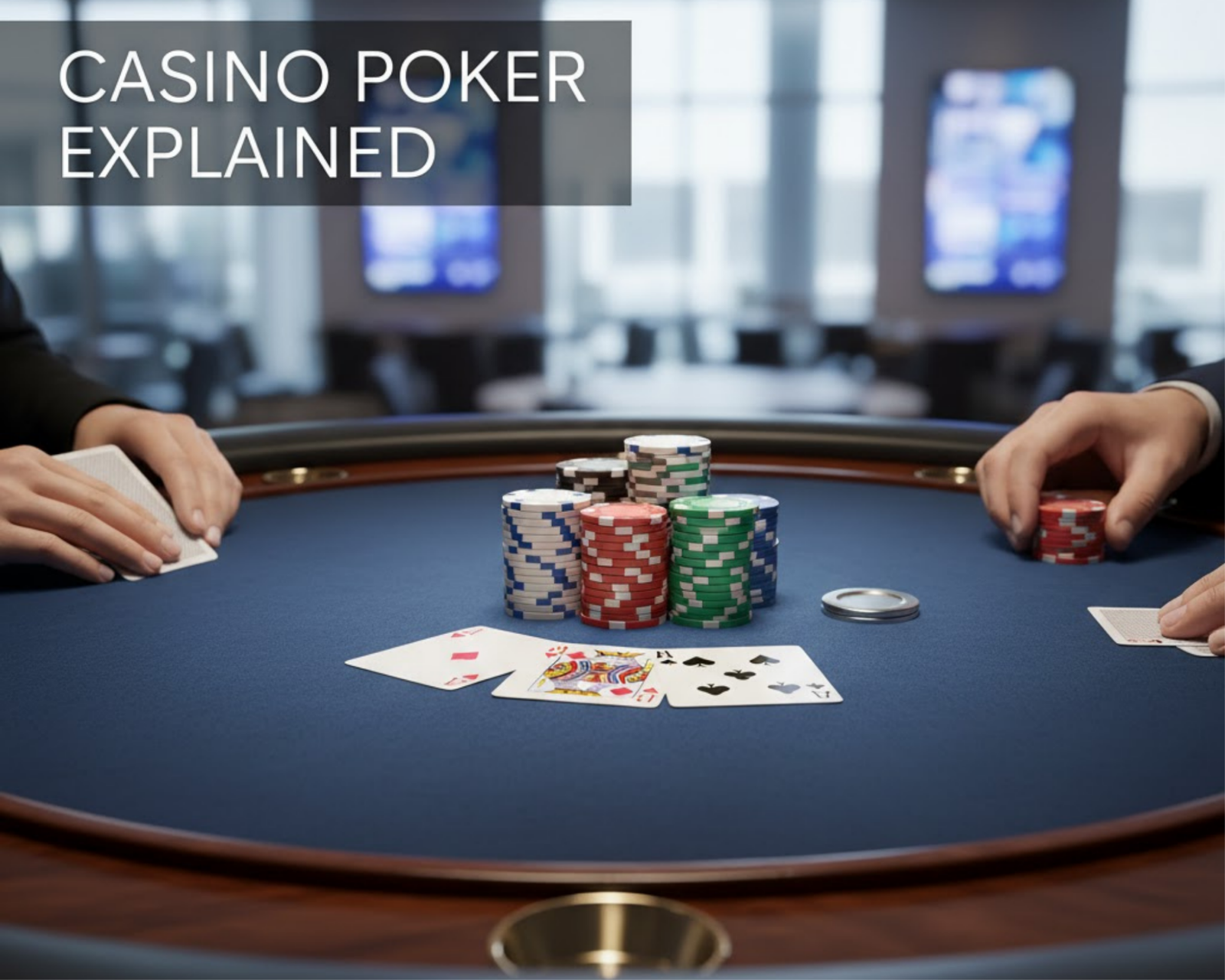Poker has always been one of the most iconic card games in the world. But when you walk into a casino, you’ll notice that “poker” can mean something a little different. Many new players assume that Casino Poker Explained is just the same as the regular poker they’ve played at home or online but in reality, the two have unique rules, structures, and experiences.
So, what exactly sets casino poker apart from traditional poker games? Let’s dive in and uncover the fascinating world of casino poker — from gameplay mechanics to house advantages — and understand how it truly stands out.
Understanding the Basics of Poker
Before we split hairs between casino poker and regular poker, let’s quickly recap what poker itself is all about.
At its core, Casino Poker Explained is a game of skill, strategy, and psychology. Players compete against one another, aiming to build the best possible hand or convince others to fold through clever betting. Success isn’t just about luck — it’s about reading opponents, calculating odds, and making bold moves when it counts.
From Texas Hold’em to Omaha, poker has evolved into countless variations. But when you step into a casino, the game takes on a slightly different flavor.
What Is Casino Poker?
Casino poker is a version of poker that’s played against the house, not other players. Unlike traditional poker, where you’re battling fellow players around the table, in casino poker you’re playing head-to-head with the dealer — much like in blackjack.
Games like Casino Hold’em, Three Card Poker, and Caribbean Stud Poker are popular examples. The dealer represents the house, and the casino makes money through a built-in house edge rather than from the rake taken from player-versus-player pots.
Regular Poker: The Classic Format
In contrast, regular poker (think Texas Hold’em or Omaha) is all about competition between players. There’s no dealer to beat — the dealer is merely there to facilitate the game.
Players wager against each other, and the casino typically earns revenue by taking a small rake (a percentage of each pot). Here, your skill in reading opponents, managing bets, and controlling emotions plays a much bigger role than in house-based casino poker.
The Biggest Difference: Player vs. Dealer
Here’s the most striking difference — who you’re playing against.
In regular poker, every player is your rival. You’re trying to outsmart real people, using bluffing, strategy, and timing to win.
But in casino poker, it’s just you versus the dealer. The social element fades, replaced by a more streamlined, fast-paced experience. You don’t need to worry about bluffing — because the dealer isn’t going to fall for it anyway.
This structure makes casino poker ideal for newcomers who want a taste of poker without the pressure of facing seasoned players.

How Betting Works in Casino Poker
In casino poker, the betting structure is simplified. Players usually place an ante bet to start the round. After seeing their cards, they can either fold or raise by placing an additional wager.
If the dealer’s hand qualifies (usually with a certain minimum hand rank like a pair of 4s), the showdown determines the winner. If your hand beats the dealer’s, you get paid according to a payout table — not from another player’s chips.
In contrast, regular poker uses more complex betting rounds — pre-flop, flop, turn, and river — with dynamic betting, raises, and bluffs at every stage.
Skill vs. Luck: The Balancing Act
Regular poker is often celebrated as a game of skill with elements of luck. Players who study strategy, understand probabilities, and master reading people can consistently profit over time.
Casino poker, however, leans more toward luck-based gameplay. Since you can’t influence the dealer’s decisions or bluff your way to victory, your fate rests mostly on card distribution. That said, a good understanding of odds and optimal play can still reduce the house edge.
Think of regular poker as a chess match and casino poker as a coin toss with flair — both exciting, but for entirely different reasons.
The Role of the House Edge
One major distinction between the two formats is the house edge.
In casino poker, every hand you play gives the casino a slight mathematical advantage. That’s how the house ensures long-term profitability. For example, in games like Caribbean Stud Poker, the house edge can range from 2% to 5%.
In regular poker, there’s no house edge against you. The casino earns its profit from a rake, while the competition remains purely between players. This is why professional players can make a living from traditional poker — their skill directly influences their long-term success.
Game Speed and Atmosphere
If you’ve ever played a live poker tournament, you know it can be slow and mentally draining. Every decision takes time, and a full table means long waits between hands.
Casino poker flips that experience on its head. It’s faster, simpler, and more straightforward. With fewer players (or just you and the dealer), games move quickly, making it perfect for casual entertainment or quick sessions during a casino night.
The environment also differs: casino poker tables often feel more like traditional casino games — flashy, energetic, and welcoming to tourists or beginners.
Popular Types of Casino Poker Games
Here are a few casino poker variants that you’ll commonly find on casino floors or online:
Casino Hold’em – Based on Texas Hold’em, but played against the dealer.
Three Card Poker – You and the dealer each get three cards; simple yet strategic.
Caribbean Stud Poker – A five-card variant with a progressive jackpot option.
Let It Ride – Players can withdraw part of their bets as the hand develops.
Pai Gow Poker – A slower, more strategic game where you create two poker hands from seven cards.
Each of these has its own house edge, payout structures, and unique twists, but all maintain the same concept — it’s you versus the casino.
The Social and Psychological Element
Regular Casino Poker Explained is as much about mind games as it is about cards. Reading body language, recognizing betting patterns, and timing bluffs are all vital skills.
Casino poker strips away that human-versus-human tension. You don’t need a “poker face” — only solid hand evaluation and luck. This makes it far less intimidating for casual players but also less rewarding for those who love the mind-bending duel of traditional poker.
Which One Should You Play?
It really depends on what kind of experience you want.
If you love strategy, competition, and the thrill of outsmarting real people, regular poker (like Texas Hold’em) is your arena. It’s a mental battle where the best players can actually gain an edge over time.
But if you’re after fast-paced fun without intimidation, casino poker is a great pick. It’s easy to learn, offers consistent payouts, and delivers that classic casino excitement without needing years of poker experience.
Online Casino Poker: The Digital Twist
The rise of online casinos has made Casino Poker Explained more accessible than ever. With live dealer games and RNG-based tables, players can enjoy casino poker right from home.
Online platforms often offer bonuses, side bets, and progressive jackpots — things you won’t find in a typical poker room. Plus, with round-the-clock availability, it’s a convenient way to enjoy poker-style action without waiting for a seat.
Tips for Playing Casino Poker Smartly
Even though luck plays a big role, you can still improve your odds with smart play.
Here are a few quick tips:
Learn the rules of each variant before betting real money.
Avoid side bets unless the odds are favorable — they usually have a higher house edge.
Set a budget and stick to it — casino poker can be quick and addictive.
Use strategy charts for specific games like Three Card Poker or Casino Hold’em.
Read More: From Vegas to Virtual: The Evolution of Casinos in the Digital Age
Conclusion
At the end of the day, both Casino Poker Explained and regular poker share the same DNA — they’re rooted in chance, strategy, and excitement. But how they play out couldn’t be more different.
Casino poker is about beating the dealer and enjoying a structured, casino-driven game. Regular poker, on the other hand, is about reading opponents, strategy, and long-term skill development.
Whichever you choose, poker in any form offers thrills, tension, and the timeless joy of turning the cards and seeing what fate (or strategy) brings your way.



